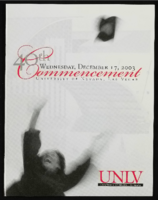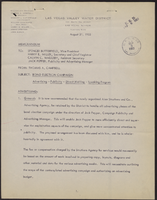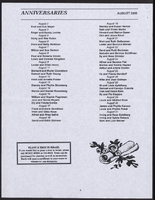Search the Special Collections and Archives Portal
Search Results
Dennis Gomes Professional Papers
Identifier
Abstract
This collection has been removed from the University of Nevada, Las Vegas Libraries Special Collections and Archives' holdings by order of the Nevada Gaming Control Board. The collection was returned to the Nevada Gaming Control Board. Please contact special.collections@unlv.edu for further information.
The collection was comprised of photocopies of materials documenting investigations undertaken from 1973 to 1977 by Dennis Gomes, in his role as Nevada Gaming Control Board Division Chief and Law Enforcement Officer. The collection included investigative material on organized crime skimming at the Stardust, the Tropicana, and other Nevada casino-hotels.
Archival Collection
Wanda Ball Moser Photographs
Identifier
Abstract
The Wanda Ball Moser Photographs depict Wanda Ball Moser and her family in Southern Nevada in the early-twentieth century. The photographs primarily depict Moser and her family at Mt. Charleston, Nevada or at home in Las Vegas, Nevada.
Archival Collection
Pacific Engineering and Production Company of Nevada (PEPCON) Records
Identifier
Abstract
The Pacific Engineering and Production Company of Nevada Records (1986-1989) are comprised of magazine articles, newspaper clippings, official reports, a profile of Jim Gibson, and a prospectus for a park named after Gibbons.
Archival Collection
Mary Lytle Papers
Identifier
Abstract
The Mary Lytle Papers date from 1909 to 1968 and document Lytle’s experience as the first midwife in Overton, Nevada. The collection contains medical certificates, professional correspondence with Nevada Assistant State Archivist Frederick C. Gale, a handwritten memoir, and black-and-white photographs.
Archival Collection
Clark County Child Care Association (CCCA) Records
Identifier
Abstract
The Clark County Child Care Association (CCCA) Records (1957-1975) contain correspondence, fliers, dues paid rosters, insurance information, bills, memberships cards, and receipts. Also included are miscellaneous dues-related documents, minutes of CCCA (Nevada) general membership and executive board meetings, and a newsletter.
Archival Collection
Gold Hill Nevada Masonic Lodge Records
Identifier
Abstract
The collection consists of three bound volumes and a small leather folder, documenting Masonic Lodge activity in Gold Hill, Nevada between 1866 and 1917. The volumes contain lodge meeting minutes from 1866 to 1872; lodge membership records from 1866 to 1872; and lodge financial records from 1866 to 1917.
Archival Collection

University of Nevada, Las Vegas (UNLV) 40th commencement program
Date
Archival Collection
Description
Commencement program from University of Nevada, Las Vegas Commencement Programs and Graduation Lists (UA-00115).
Text

Memo from Thomas A. Campbell to Spencer Butterfield and others about the bond election campaign, August 31, 1953
Date
Archival Collection
Description
Details of advertising campaign to promote the bond election
Text


